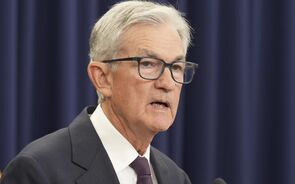EUR/USD/YEN
1 Mensagem
|Página 1 de 1
EUR/USD/YEN
Though the dollar is extending its gains against major currencies on further signs of strong growth in the U.S. economy, the yen can rebuff its advances in coming weeks as it remains the investment destination of choice on a recovery in global demand.
To be sure, buying yen against the dollar might well reap rewards for investors, but the safer bet during this battle for supremacy between the Japanese and U.S. currencies would be to sell euros against yen.
There seems little doubt that of the world's three major economic regions - the U.S., Japan and Europe - the latter is the underachiever by a significant margin for reasons including governments' lack of fiscal discipline, labor market rigidities and overly high interest rates. "Sell euro-yen on rallies," said Jan Lambregts, currency strategist with Rabobank. "It's not that the dollar can't go down against the yen, but with euro-yen, both sides of the equation are working in your favor."
Lambregts said news flow from Japan is likely to remain yen-positive in coming months with further portfolio capital inflows, a less interventionist stance by the Ministry of Finance, economic data and technical factors conspiring to lift the currency. In Europe, however, a European Central Bank interest rate cut is in the cards for either May or June, and easing speculation ahead of these meetings should weigh on the cross, he said. Analysts said a euro low April 5 at Y125.75 is a near-term target, and a break beneath there would open a decline to Y125 psychological support.
"Euro-yen is less risky and is likely to be less choppy than dollar-yen, which could, for example, extend its near-term gains if inflation data from the U.S. later today came in higher than expected," said Lambregts. Indeed, more strong U.S. economic data should weigh on the cross, he said, as the dollar's gains are likely to be more muted against the yen than the euro under this scenario. Numbers issued so far this month, including non-farm payrolls (up 308,000 in March), retail sales (up 1.8% in March, the strongest advance in one year) and a sixth straight monthly gain in business inventories in February all point to U.S. economic recovery.
EU Fiscal, Econ Woes Hurting Euro
And with this has come expectations of a Federal Reserve rate hike in August, which would lift its target rate from a 46-year low at 1%. Tightening talk helped the dollar mount a broad-based recovery, but uncertainty over the endgame of the U.S.-led occupation of Iraq raises the likelihood of volatility in the euro-dollar exchange rate.
Aside from yen- and dollar-positive factors, Macquarie Bank currency analysts said questions over the credibility of ECB policy, and breaches of the European Union's Stability and Growth Pact are weighing on the euro.
In 2004, the ECB estimates six countries will have deficits greater than the 3.0% of gross domestic product allowed under the accord, which is being held in abeyance until November after Germany and France broke the rules. If these fiscal rules are flouted with impunity by Europe's major economies it will be difficult to convince smaller nations to not follow suit and run similar budget policies.
"It's not all that long ago that the euro was floated (January 1999) with a degree of fanfare, with the big selling point being the credibility that the pact conferred on the currency," said the Macquarie analysts. The ECB doesn't have the credibility that Germany's Bundesbank once had, and the analysts said the notion that the Stability and Growth Pact is achieving fiscal discipline is somewhat of a joke. Yen Up On Portfolio Capital, Trade Flows
Some governments' disregard for budget limits was highlighted by comments Tuesday from Italy's Economy Minister Giulio Tremonti who said the government planned to push ahead with proposed tax cuts to reflect that Europe is "in a new historic (economic) cycle." "In Europe, we are not in the normal ebb of the normal economic cycle," he said in an article in Il Sole 24 Ore newspaper. Tremonti said with the euro-zone growing just 0.4% in 2003 compared to more than 9% in China, Europe must take radical steps to revive growth.
With Japan also posting strong growth - GDP grew at an annualized rate of 6.4% in the final quarter of last year, its fastest pace in 13 years - Macquarie also likes the idea of selling euro-yen. "The Nikkei is doing more than OK, Japanese government bonds are selling, Japanese trade numbers are telling us that the stronger yen isn't a problem," it said.
The benchmark Nikkei 225 index of Japanese stock prices this week hit a 32-month high at 12,170.96, up 14% so far this year, driven to a significant degree by foreign capital inflows. Japan's Ministry of Finance said Monday that foreign investors bought a net Y2.69 trillion of Japanese stocks - a monthly record - in March, contributing to a net portfolio inflow overall of Y1.21 trillion in the month.
The ministry also said Japan's current account surplus expanded 46.2% in February from the same month a year earlier to Y2.157 trillion before seasonal adjustment, marking the eighth straight month of expansion as a booming export sector propels the country's economic revival.
These factors make selling euro against yen in coming days and weeks "a no-brainer," as long as investors are "patient and wait for a bit of a rally," said a U.S. bank trader in Singapore.
To be sure, buying yen against the dollar might well reap rewards for investors, but the safer bet during this battle for supremacy between the Japanese and U.S. currencies would be to sell euros against yen.
There seems little doubt that of the world's three major economic regions - the U.S., Japan and Europe - the latter is the underachiever by a significant margin for reasons including governments' lack of fiscal discipline, labor market rigidities and overly high interest rates. "Sell euro-yen on rallies," said Jan Lambregts, currency strategist with Rabobank. "It's not that the dollar can't go down against the yen, but with euro-yen, both sides of the equation are working in your favor."
Lambregts said news flow from Japan is likely to remain yen-positive in coming months with further portfolio capital inflows, a less interventionist stance by the Ministry of Finance, economic data and technical factors conspiring to lift the currency. In Europe, however, a European Central Bank interest rate cut is in the cards for either May or June, and easing speculation ahead of these meetings should weigh on the cross, he said. Analysts said a euro low April 5 at Y125.75 is a near-term target, and a break beneath there would open a decline to Y125 psychological support.
"Euro-yen is less risky and is likely to be less choppy than dollar-yen, which could, for example, extend its near-term gains if inflation data from the U.S. later today came in higher than expected," said Lambregts. Indeed, more strong U.S. economic data should weigh on the cross, he said, as the dollar's gains are likely to be more muted against the yen than the euro under this scenario. Numbers issued so far this month, including non-farm payrolls (up 308,000 in March), retail sales (up 1.8% in March, the strongest advance in one year) and a sixth straight monthly gain in business inventories in February all point to U.S. economic recovery.
EU Fiscal, Econ Woes Hurting Euro
And with this has come expectations of a Federal Reserve rate hike in August, which would lift its target rate from a 46-year low at 1%. Tightening talk helped the dollar mount a broad-based recovery, but uncertainty over the endgame of the U.S.-led occupation of Iraq raises the likelihood of volatility in the euro-dollar exchange rate.
Aside from yen- and dollar-positive factors, Macquarie Bank currency analysts said questions over the credibility of ECB policy, and breaches of the European Union's Stability and Growth Pact are weighing on the euro.
In 2004, the ECB estimates six countries will have deficits greater than the 3.0% of gross domestic product allowed under the accord, which is being held in abeyance until November after Germany and France broke the rules. If these fiscal rules are flouted with impunity by Europe's major economies it will be difficult to convince smaller nations to not follow suit and run similar budget policies.
"It's not all that long ago that the euro was floated (January 1999) with a degree of fanfare, with the big selling point being the credibility that the pact conferred on the currency," said the Macquarie analysts. The ECB doesn't have the credibility that Germany's Bundesbank once had, and the analysts said the notion that the Stability and Growth Pact is achieving fiscal discipline is somewhat of a joke. Yen Up On Portfolio Capital, Trade Flows
Some governments' disregard for budget limits was highlighted by comments Tuesday from Italy's Economy Minister Giulio Tremonti who said the government planned to push ahead with proposed tax cuts to reflect that Europe is "in a new historic (economic) cycle." "In Europe, we are not in the normal ebb of the normal economic cycle," he said in an article in Il Sole 24 Ore newspaper. Tremonti said with the euro-zone growing just 0.4% in 2003 compared to more than 9% in China, Europe must take radical steps to revive growth.
With Japan also posting strong growth - GDP grew at an annualized rate of 6.4% in the final quarter of last year, its fastest pace in 13 years - Macquarie also likes the idea of selling euro-yen. "The Nikkei is doing more than OK, Japanese government bonds are selling, Japanese trade numbers are telling us that the stronger yen isn't a problem," it said.
The benchmark Nikkei 225 index of Japanese stock prices this week hit a 32-month high at 12,170.96, up 14% so far this year, driven to a significant degree by foreign capital inflows. Japan's Ministry of Finance said Monday that foreign investors bought a net Y2.69 trillion of Japanese stocks - a monthly record - in March, contributing to a net portfolio inflow overall of Y1.21 trillion in the month.
The ministry also said Japan's current account surplus expanded 46.2% in February from the same month a year earlier to Y2.157 trillion before seasonal adjustment, marking the eighth straight month of expansion as a booming export sector propels the country's economic revival.
These factors make selling euro against yen in coming days and weeks "a no-brainer," as long as investors are "patient and wait for a bit of a rally," said a U.S. bank trader in Singapore.
- Mensagens: 888
- Registado: 5/11/2002 10:56
1 Mensagem
|Página 1 de 1
Quem está ligado:


